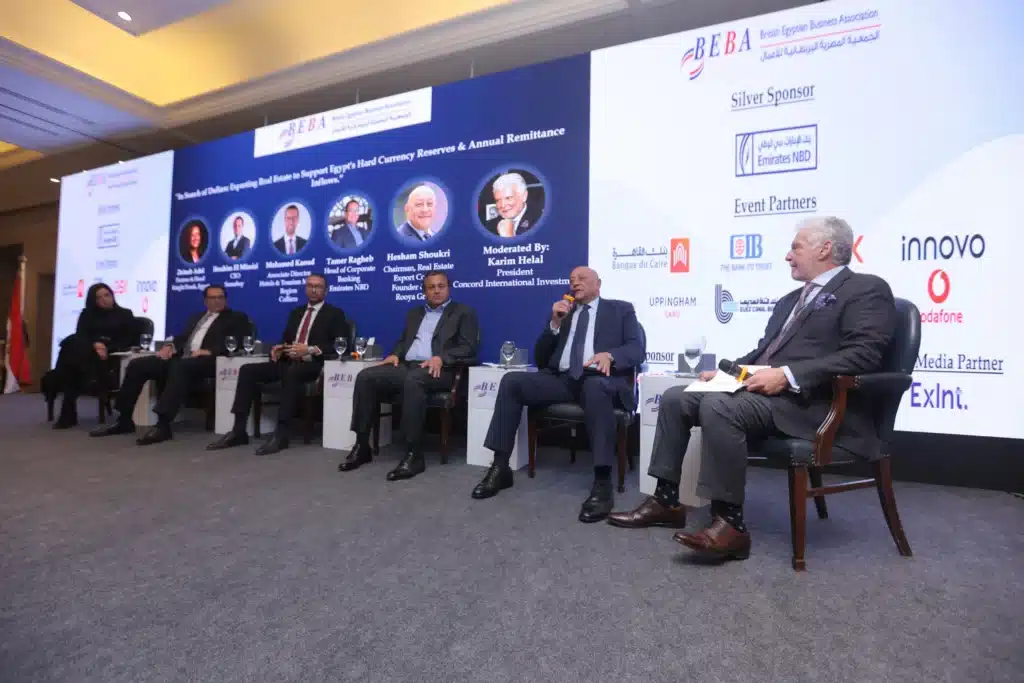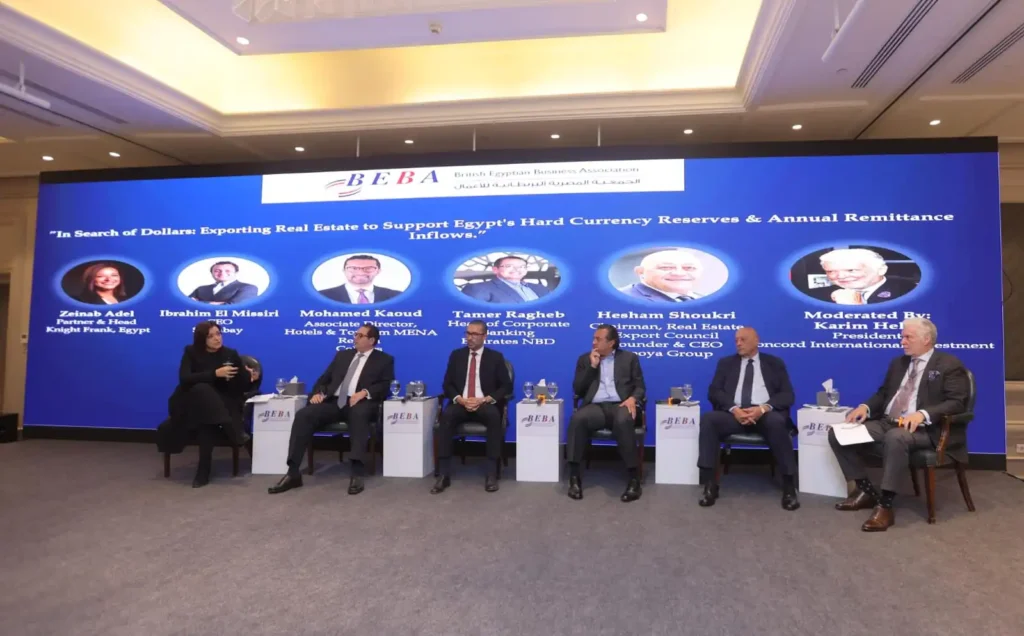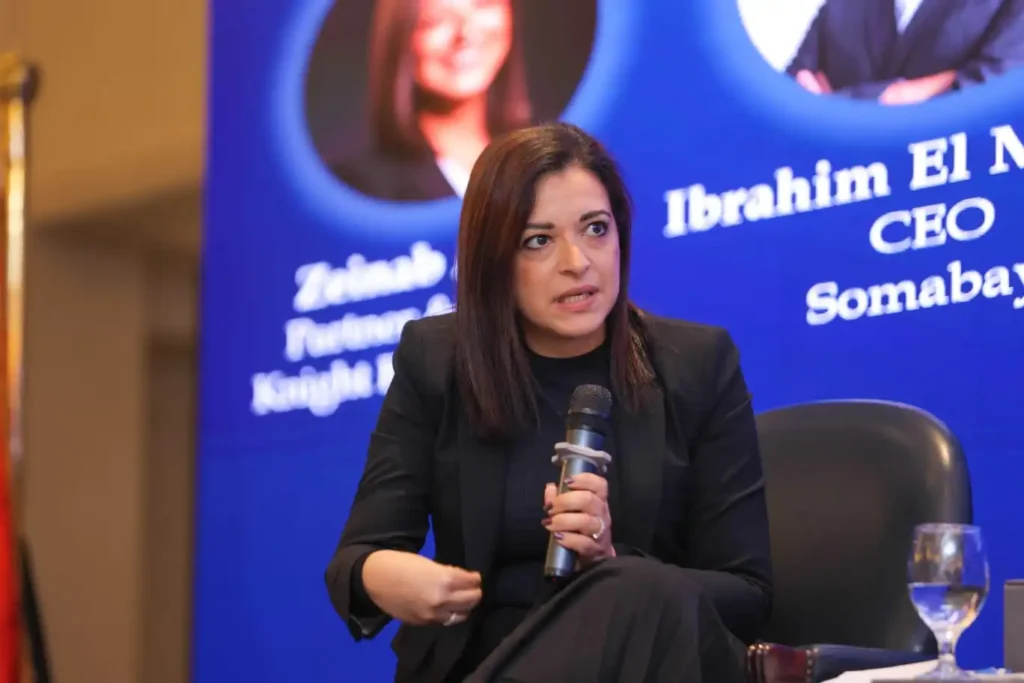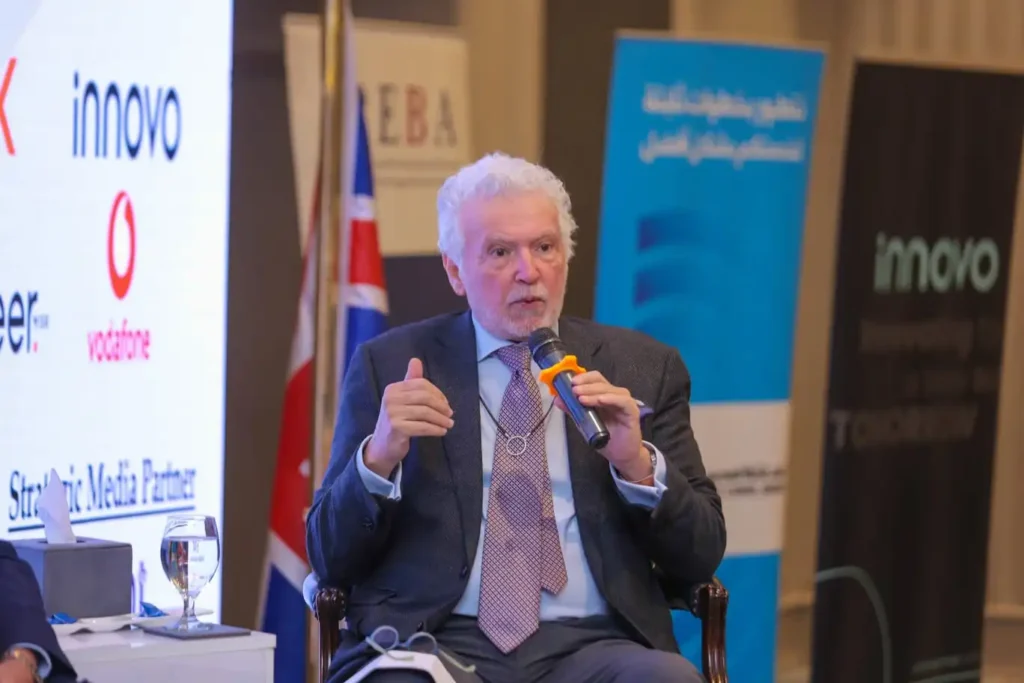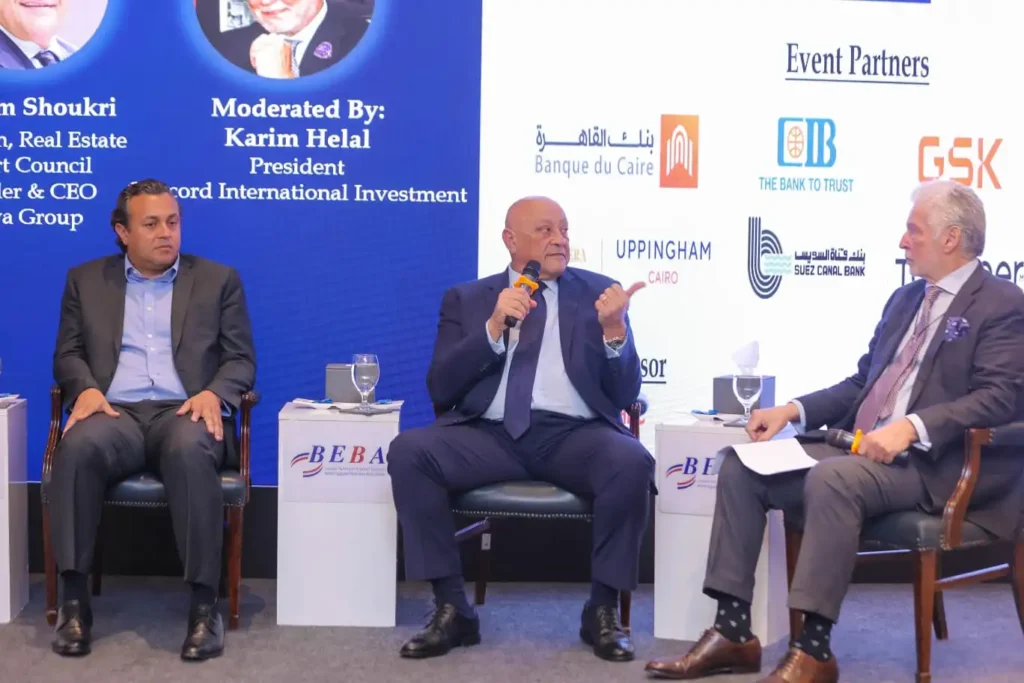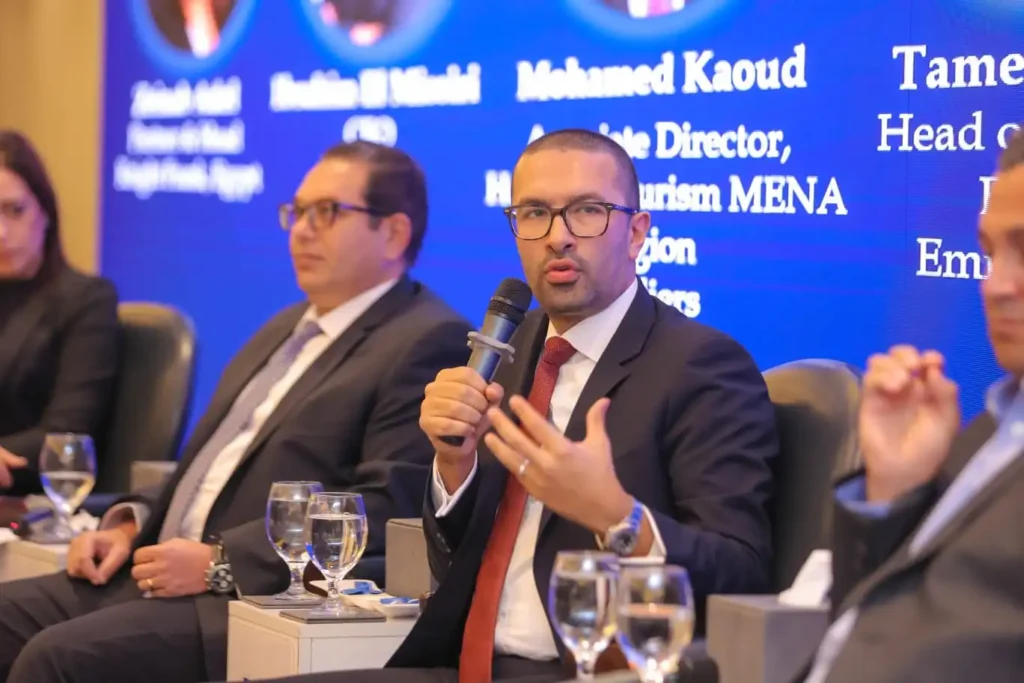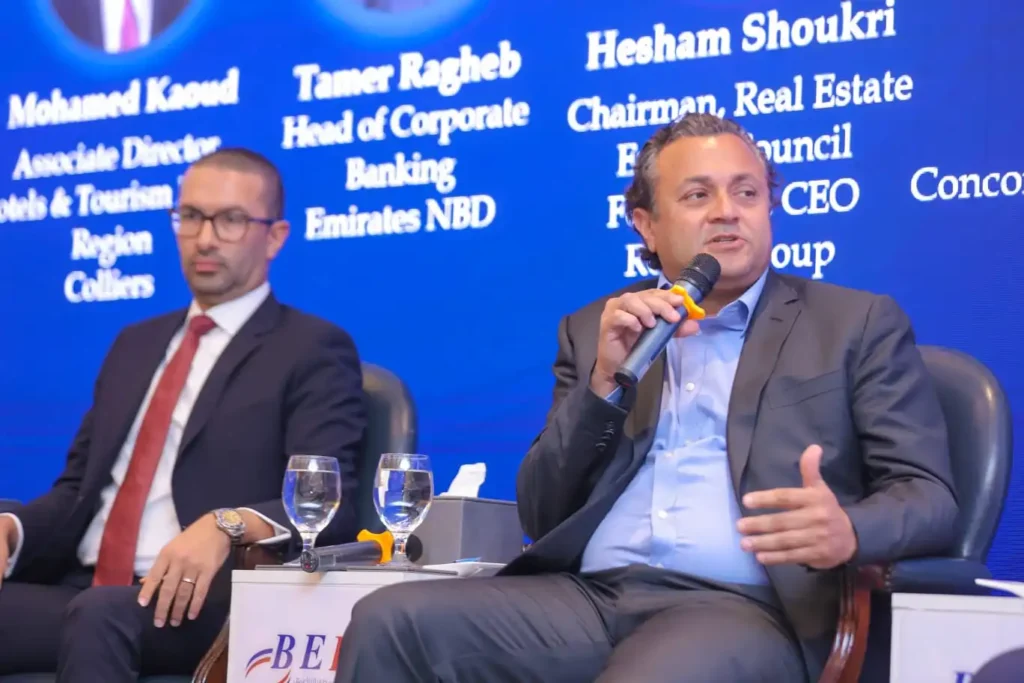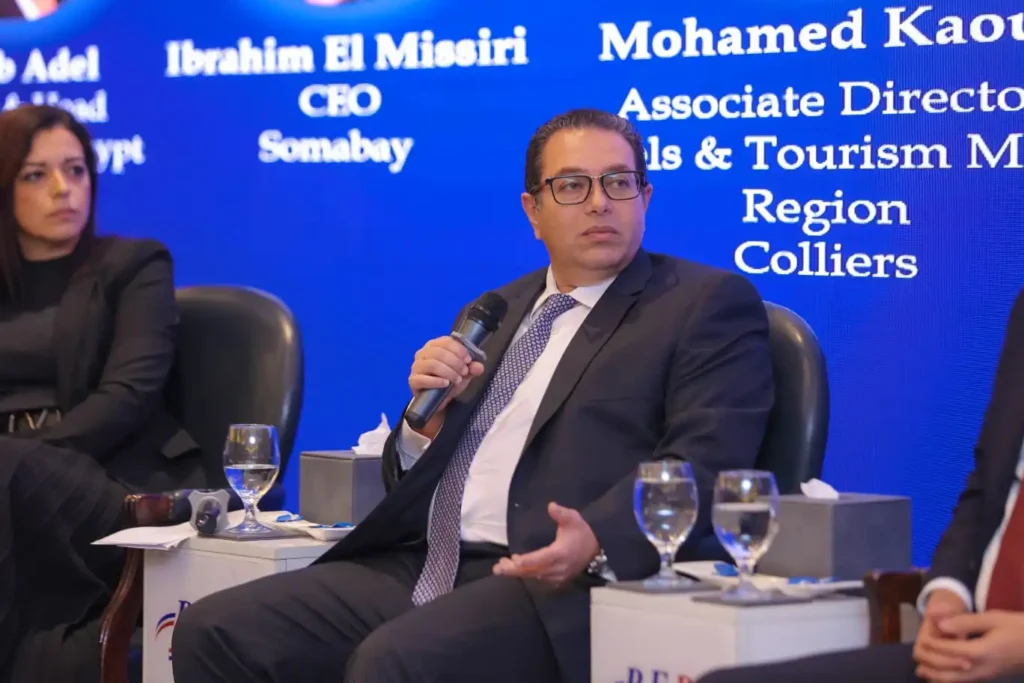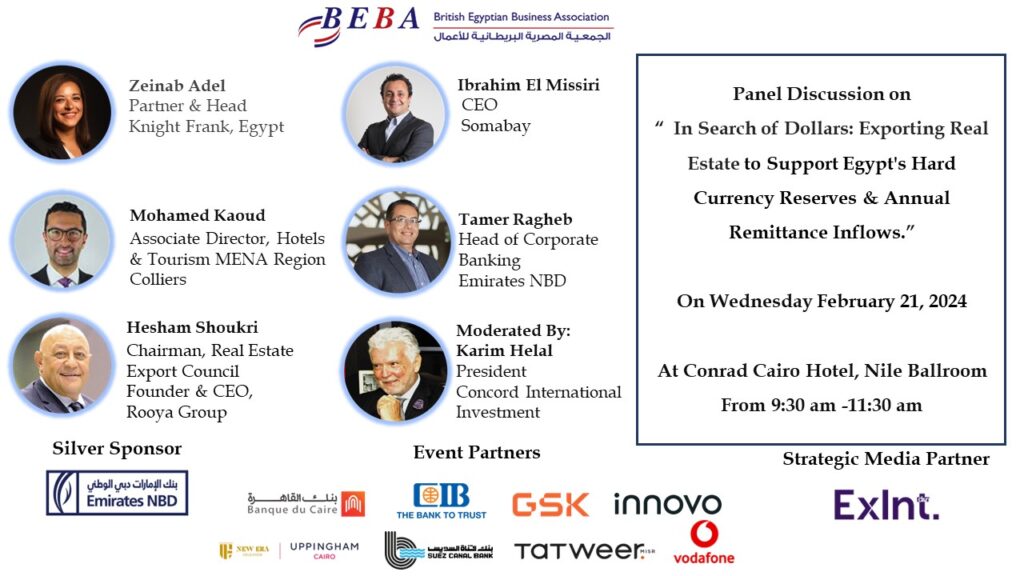be the first to attend This Event
Online bookings are not available for this event.
The British Egyptian Business Association (BEBA) organised a panel discussion on “In Search of Dollars: Exporting Real Estate to Support Egypt’s Hard Currency Reserves & Annual Remittance Inflows.” The objective of the event is to empower organizations in addressing the challenges posed by the evolving landscape of economic challenges.
The panel included the following speakers, Mohamed Kaoud, Associate Director, Hotels & Tourism MENA Region Colliers; Ibrahim El Missiri, CEO, Somabay; Tamer Ragheb, Head of Corporate Banking, Emirates NBD; Zeinab Adel, Partner, Head of Egypt Knight Frank; Hesham Shoukri, Chairman, Real Estate Export Council Founder & CEO, Rooya Group and lastly, moderated by Karim Helal, President Concord International Investment.
Helal, President, Concord International Investment started the session by emphasizing the focus of exploring unconventional approaches to generate much-needed dollars. In his welcoming remarks, he welcomed the attendees, including the Singaporean ambassador H.E Dominic Goh, as well as embassy representative and Deputy Chief of Mission Sun from the Republic of Korea. In addition, Helal expressed his appreciation and support to BEBA’s initiative to invite young leaders from schools and universities to attend its events, such as students from Oasis.
Helal highlighted the ongoing pursuit of dollars through many ways, both conventional and unconventional. He pointed out the long-standing mention of a particular topic – exporting real estate – and credited Shoukri, Chairman, Real Estate Export Council Founder & CEO, Rooya Group as a pioneer who advocated for this idea over a decade ago. Helal acknowledged that this approach is relatively new for Egypt, lacking experience, track records, and a global reputation as a second home destination. He candidly acknowledged the need to manage expectations grounded in a solid foundation.
Helal then turned to Shoukri, posing two key questions; firstly, he requested a brief explanation of the new Ministry of Finance initiative designed to assist developers in generating dollars, acknowledging its controversial nature. Secondly, Helal sought Shoukri’s personal insights on whether the initiative is effective or if there are notable shortcomings.
Shoukri responded to Helal’s question, clarifying that they had discussed the same issue 15 years ago. He emphasized that the need for real estate export arose around 2007-2008 due to increased interest from foreigners in buying second homes. However, he noted that Egypt lacked organization in comparison to countries like Turkey and Greece, which had strategic plans and government support.
He highlighted that, historically, Egypt did receive foreign currency from property purchases, although not organized. He estimated around 3-4 billion USD annually coming from publishing issues. The challenge was that these funds were not entering the system but going to the black market. The Minister of Finance’s recent incentives aimed to address this issue, encouraging developers to bring dollars into the system.
However, Shoukri expressed his concerns about the proposed incentive where developers receive 80% of the amount in Egyptian pounds after 10 years. He questioned its effectiveness, considering the significant exchange rate difference. He acknowledged the need for a more streamlined system, recognizing that while a black market may persist, narrowing the rate difference would be crucial. The current rate difference, almost double, poses a major challenge that needs attention.
Helal raised another question about developers setting expenses in dollars, expressing surprise that some developers claimed they were not allowed to do so. Shoukri clarified that the government does not object to it, but the challenge lies in determining the value of the unit using the official rate versus the black-market rate. The difference between pricing with the official rate and later converting with the black-market rate can pose an issue for developers.
Shoukri explained that many developers already use the black-market rate when pricing their units. Some even adjust prices weekly due to market fluctuations, especially in the context of building materials. The key issue he highlighted was the costing process, and he suggested that developers should have the option to set expenses in dollars to align with their pricing methods. He emphasized that the problem is not with the government but rather with the limitations faced by developers in managing costs effectively.
Helal addressed El Missiri, CEO of Somabay, commending their active development efforts and expansion, especially in real estate. He questioned the strategy to attract foreigners to invest in properties at Somabay, considering the competition from countries like Turkey. He asked what makes Somabay unique and why someone should choose to buy there.
El Missiri responded by highlighting Egypt’s main competitive advantage – being the only place within a 4-hour flight that offers winter sun. He emphasized the simplicity of the equation: foreigners, especially Europeans, seek an escape from the harsh winter, and Egypt provides an affordable option with pleasant weather.
He acknowledged that Egypt’s property prices, even with the devaluation, are still relatively cheap compared to European markets, making it an attractive proposition. However, he also pointed out challenges related to flights, entry restrictions, difficulty setting up bank accounts, and the lack of implementation of certain benefits for foreign buyers.
El Missiri expressed optimism that with the right adjustments, such as improving connectivity and implementing existing laws, the floodgates for foreign property buyers could open. El Missiri also touched upon the logistical challenges faced by Egyptian expats in the Gulf, stating that despite being a significant market, connectivity issues and complexities make it challenging for them to invest in Egyptian properties.
Shoukri shared his concerns about the slow progress in attracting property buyers.
Discussions on this topic started around 10 years ago, but the implementation of initiatives has been delayed due to a security-focused mindset in the government. Despite having laws, the appeal of Egyptian nationality to foreigners remains a challenge. Shoukri emphasized the need for simpler registration processes for foreigners buying properties.
Helal shared the necessities, highlighting the necessity for a coordinated approach involving different aspects like aviation, tourism, and government policies. He questioned whether anyone in the government was addressing these issues and if there had been any progress.
Shoukri acknowledged the challenges in implementation and suggested that the government should have a real estate publicity department to streamline processes. Both emphasized the need for a broader perspective to connect the pieces of the puzzle for a more effective solution.
Helal turned the conversation to Zeinab, Partner, Head of Egypt Knight Frank, he described Knight Frank as a prominent property company globally, known for dealing with the higher end of the market. He questioned why Knight Frank chose to enter the Egyptian market at this moment and whether it indicated a perceived demand. Additionally, Helal asked Zeinab about their focus on the English, UK, and European markets and how Egypt fits into their agenda.
Zeinab responded by stating that the decision might have been a bit late, but entering the Egyptian real estate market is always viable due to the country’s constant demand and supply. She highlighted that Knight Frank has been in Africa for a long time, and entering Egypt completes their presence in bridging the Middle East, Europe, and Africa. Regarding Egypt’s viability for European investments, Zeinab expressed confidence but stressed the need for collaborative efforts between the government and developers. She acknowledged the challenges, including the geopolitical situation affecting Europe’s perception of Egypt. Zeinab emphasized the importance of marketing, branding, and positioning to attract investments. While acknowledging Europe’s sensitivity to pricing and politics, she highlighted Egypt’s potential to attract demand from the Gulf Cooperation Council (GCC) countries. Zeinab shared research findings indicating a high demand from GCC nationals, especially for properties on the North Coast and the Red Sea. She emphasized that Europeans and GCC nationals have different preferences, requiring a tailored approach for each market. Zeinab noted that the majority of GCC buyers are interested in purchasing properties for personal use, with many looking to rent them out. Despite the challenges, she highlighted the cultural similarities and the love GCC nationals have for Egypt’s weather and affordability.
Helal shifted the discussion towards the broader ecosystem of destinations, emphasizing the importance of a user-friendly approach, especially in terms of security and procedures. He suggested considering the concept of senior living as a potential market, catering to pensioners and Europeans seeking a kinder winter. Shoukri expressed the need for medical services in places like Egypt, citing examples from other countries like Cyprus.
Zeinab suggested that developers could consider bringing in established medical operators to run health facilities, avoiding the need to create their own brand. She stressed the importance of investing in these facilities first to attract senior living investors.
El Missiri shared challenges faced in bringing European-focused medical facilities to Egypt, including issues with insurance and the loss-making nature of such facilities due to European laws.
Helal emphasized the importance of a decent standard facility that meets the needs of residents. He referenced the success of the hospital in El Gouna, initially considered a part of the marketing budget and not intended as a profit center.
Helal directed a question to Kaoud, Associate Director, Hotels &Tourism MENA Region Colliers, regarding the role of hospitality assets, particularly hotels, in exporting real estate. Kaoud mentioned that they have been involved in managing transactions within Egypt, dealing with family offices, individuals, sovereign funds, and investment institutions. He highlighted the importance of creating a quality of life to attract clients and emphasized the need for developers to offer a comprehensive and appealing experience.
Kaoud expressed his optimism about opportunities in real estate in Egypt due to factors like geographic location and evaluation. He discussed strategic planning for districts and mentioned the challenges faced in the hospitality sector, including consistency in quality and the need for support from various entities. Kaoud also touched upon joint ventures and partnerships as potential solutions.
Helal acknowledged the positive outlook from Kaoud but emphasized the missing piece in the ecosystem, particularly in making the overall experience user-friendly, starting from the airport.
Helal directed questions to Ragheb, Head of Corporate Banking, Emirates NBD about the role of banks, especially in the context of real estate development, hospitality assets, and promoting Egyptian real estate to Gulf buyers.
Ragheb began by discussing regulatory moves, including challenges related to lending, foreign currency contracts, and the need for standardized regulations for exporting real estate. He emphasized the importance of creating standards and meeting international demands to attract foreign buyers. Ragheb mentioned the role of banks in providing personal loans and mortgages, highlighting the need for regulatory frameworks and liquidity.
El Missiri intervened, expressing doubt about the current role of developers and banks.
He argued that developers in Egypt are essentially acting as banks, taking on risks and responsibilities that banks should handle. El Missiri criticized the lack of a functioning mortgage system and the burden placed on developers, potentially leading to a collapse in the real estate market. He called for a reevaluation of the roles and responsibilities of developers and banks.
Ragheb acknowledged challenges in the current system, particularly related to interest rates and expensive mortgages. He mentioned the unique proposition when developers start selling before building and acknowledged that developers might not be entirely satisfied with the current setup.
Attendees highlighted the need for collaboration and a win-win approach among stakeholders, including developers, banks, and the government. Suggestions were made to address issues such as visa, flights, medical facilities, and registration to attract more foreign buyers.
Sherif Seif El-Nasr from Tatweer and Palm Hills shared insights into the growing demand from Egyptian expats and foreign buyers due to factors like devaluation. He emphasized the importance of a coordinated effort in promoting Egypt and creating a dedicated entity for marketing.
Helal suggested the formation of a Real Estate Export Council with empowered stakeholders to drive progress. Attendees discussed the need for regulatory bodies and the challenges of achieving collaboration among different stakeholders.
A student from Oasis School raised a question about transparency in the real estate market and suggested a regulatory approach to address the issue.
Elmissiri responded by emphasizing the importance of having an entity with the power to make decisions and override regulations when necessary, citing successful models like the Roads and Transport Authority (RTA) in Dubai.
Shoukri responded by highlighting the need for data sharing among stakeholders in the real estate industry. He suggested the creation of a alliance involving banks, developers, contractors, legal entities, and marketing agencies to collectively work towards establishing a regulatory body.
However, another participant from Suez Canal Bank expressed concerns about the potential complications of bringing all stakeholders together, citing slow decision-making processes. Instead, they recommended a strong regulator with the empowerment to make decisions, possibly with the support of an international consulting firm to provide research and insights.
Participants debated the role of entertainment and attractions, suggesting the development of theme parks like Ferrari World and IMG to attract tourists and investors.
El Missiri emphasized their efforts in creating golf courses and promoting water sports. However, regulatory and taxation challenges in Egypt were acknowledged as obstacles to such developments. The importance of adequate medical care emerged as a critical factor, not only for foreigners but also for Egyptians. The absence of nearby medical facilities was noted as a potential deal-breaker for prospective property buyers. The conversation delved into regulatory hurdles, taxation complexities, and the absence of effective oversight as barriers to various developments. There was a consensus on the need for a robust regulator, similar to successful models in Dubai and Saudi Arabia, to streamline processes and encourage investment. Transparency in the real estate market and the sharing of data among stakeholders were advocated to facilitate well-informed decision-making and attract investors.
A relevant question from another student addressed concerns about economic stability and investment safety. The need for reassurance and the bridging of gaps in access to finance, particularly for international investors, was a part of the discussion.
Collaborations with international financial institutions, exemplified by the European Bank for Reconstruction and Development (EBRD), were identified as potential solutions to bridge financial gaps and support policy dialogue.
In concluding remarks, Helal expressed gratitude to the participants and highlighted an optimistic outlook. He emphasized the importance of maintaining faith, staying positive, and actively participating in events. The remarks had a collective belief in a positive future for the real estate sector in Egypt. Acknowledgments were extended to the Oasis international school for their participation in the discussion.

